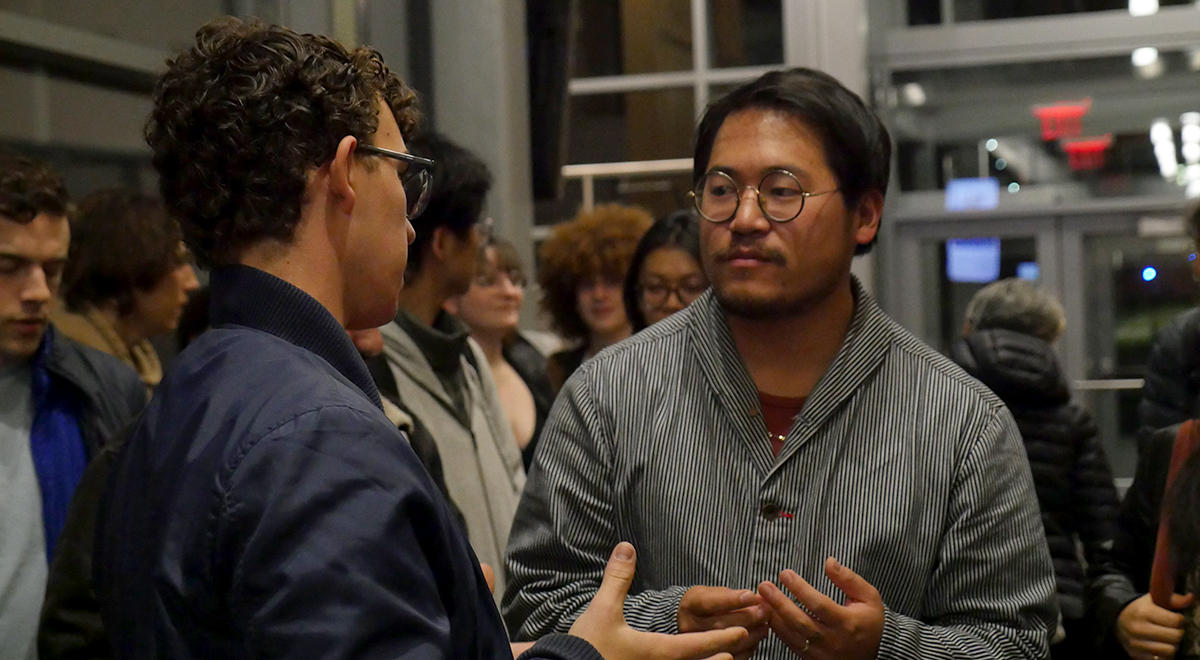‘Everything Everywhere All At Once’ Director Speaks about Creativity and the Multiverse

By Rose Chen ’26
On Thursday, Nov. 16, students gathered at the Jeanine Basinger Center for Film Studies for a conversation between film director Daniel Kwan and Professor of Religion, Philosophy, Science in Society, and Feminist, Gender, and Sexuality Studies, and Dean of the Social Sciences Mary-Jane Rubenstein.
Kwan, having previously directed music video “Turn Down for What” and Swiss Army Man (2016), is most renowned for Everything Everywhere All At Once (2022), which won seven Oscar awards out of eleven nominations and is estimated to be one of the most awarded films of all time. The event was organized by the Center for the Arts in collaboration with the College of Film and the Moving Image.
Kwan came across Rubenstein’s book Worlds Without End: The Many Lives of the Multiverse in the middle of researching the script for Everything Everywhere All At Once, an absurdist comedy-drama that follows a Chinese immigrant mother as she connects with parallel versions of herself to stop a powerful being from tearing down the multiverse.
“When it comes time to write, I need to know everything I can about a subject, and so I read a lot of multiverse books,” Kwan said. “Most of them were great, but a lot of them mostly focused on just the science of the science behind the theory… But when I came across [Worlds Without End], I got super excited because suddenly here was someone asking these really impossibly large questions that were unanswerable about these bigger themes of morality and God and philosophy and spirituality within the context of the multiverse. And so, it became one of my guiding lights while writing the script.”
In response to Rubenstein’s question about other inspirations behind the film and the decision to center the plot on an immigrant woman struggling to keep her family together, Kwan spoke to his attempt to capture the language of infinity as defined in mathematics or physics into a narrative. He eventually realized that the effort to capture everything mirrored the current hyper-connected world where everything feels infinite in both positive and negative ways.
“With a story that complicated, I really just wanted to fall back on what I knew for the characters,” Kwan said. “And I had been wanting to work on a film about my family, and my parents specifically, because I think most of my work starts with questions of how does infinity work? And how do my parents work?”
Kwan and Rubenstein also discussed the importance and creation of stories, particularly through myth-telling.
“We have this notion that we’ve grown up out of myths… and that we used to have stories and now we have truth, and we used to have myth, and now we have science,” Rubenstein said. “What I get really excited about are the times when, in particular, the natural sciences start doing stuff that sounds and looks to me a lot like myth as a person who’s trained in religious studies.”
Rubenstein described her experience speaking about dark energy–the pressure of empty space, which is not only expanding the universe, but also accelerating the expansion–when it was first discovered by two independent teams of scientists in 1998 and which reignited interest in parallel universes and multiple worlds among physicists despite dismissals of such theories in decades prior.
“At the edges of ‘respectable’ physics and ‘respectable’ cosmology, physics itself with this question of dark energy and the question of the multiverse was like tumbling into something like religion,” Rubenstein said. “They started telling stories again, and I got so excited, not because I wanted to try to confirm that old things that Democritus had said were true… but because it seemed to me that the science at their limits, at their edges, were producing new myths.”
During the Q&A, Kwan also answered questions about the place of creativity and collaboration within storytelling and innovation. Students applauded the integrative nature of the event, as well as Kwan’s insights into multifaceted representation both in and outside of the filmmaking process.
“I didn’t really know what to expect when I showed up— was this talk going to be centered around movies? Around writing? Around science? — and it exceeded every expectation I had,” Caroline Lamoureux ’25, a double major in Astronomy and Film, said. “The thing that stuck out to me most was how interdisciplinary the conversation became. By debating, say, the ethics of openAI alongside the nuances of an immigrant family’s relationship, Rubenstein and Kwan were able to transcend their fields of expertise. Their multifaceted viewpoints made this metaphysical conversation feel very, very human.”

